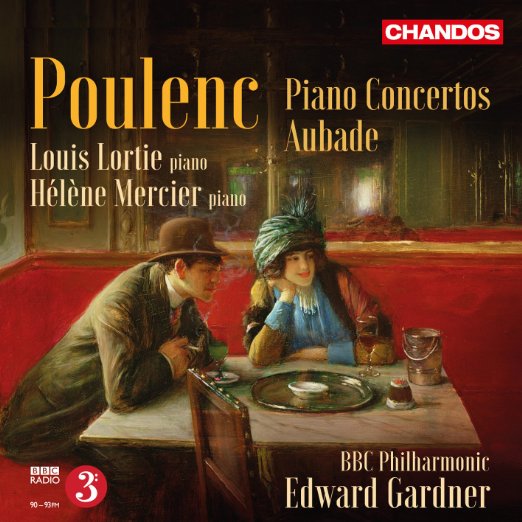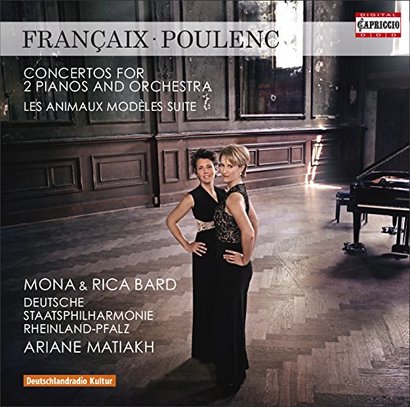|
Chandos once again delivers the most satisfying and bang-for-the-buck/state-of-the-art product of any label today (with perhaps the exception of Naxos). Their programming is intelligent and logical, their CDs are packed to capacity (often with 75+ minutes of music!), and superlative sound is a given - often in multi-channel SACD. After recently enjoying their latest offering of over 75 minutes of glorious Saint-Saens concertos (Neeme Jarvi, conducting), I am now wallowing in Poulenc. It is fantastic to have all of these Poulenc concertante works combined on one disc. The Piano Concerto and Aubade utilize one pianist (Louis Lortie), while the Double Concerto and the remaining pieces, sans orchestra, utilize two players.
While all of these works have been recorded before, it is good to have, at last, a modern digital recording of performances which can more than measure up to classic accounts. If these readings lack just the last ounce of sheer oomph and powerful characterization found in the very best (Le Sage on RCA reigns absolutely supreme in Poulenc), they make up for it in sheer precision of playing. Crisp, clean and perfectly executed passagework combined with a slight - and appropriate - "French-feeling" sensitivity combine to make a most satisfying result. The BBC Philharmonic plays beautifully for Gardner. The Concerto for Two Pianos is a personal favorite of mine; it is surely one of Poulenc's very best creations. I was lucky enough to take a chance on another recent recording of it on Capriccio, from an unknown piano duo, the Bairds (see below). And it is an interesting comparison. The Bairds also bring a slight softening in a French-flavored way, yet they benefit from an even more energetic orchestral support from Ariane Matiakh and the Deutsche Staatsphilharmonie. However, Capriccio's recording is not quite as spacious or lustrous as Chandos's. Indeed, this Chandos recording cannot be praised highly enough. It is exemplary: warm and full-bodied, yet with a most glorious (and accurate) portrayal of the clear, natural bell-like "ping" and ringing resonance of Steinway pianos. (I find it odd that so many main-stream recordings have trouble capturing this piano characteristic.) It also captures the hall acoustic beautifully, with an effortless amplitude in orchestral fortissimos. The Capriccio, in comparison, has a slightly stark soundstage and the orchestral sound lacks a bit of sonic allure and bloom. Couplings are a significant factor when comparing these two recordings of the Double Concerto. Capriccio provides another enjoyable and rewarding double concerto, that by Francaix, and an orchestral ballet suite by Poulenc - both somewhat rare on record. Chandos offers, of course, Poulenc's splendid Piano Concerto, plus a wonderful set of piano pieces for two players. The Sonata for Piano Four Hands is magnificently inventive and original, and one regrets that there is not more to it (its three movements play for just under 6 minutes). The Elegie and L'Embarquement, for two pianos, are also splendid, but short. Finally, this Chandos release is one of the most enjoyable Poulenc collections of modern recordings I've encountered. I highly recommend it and would not want to be without it or the recent Capriccio release. ************************************************************************************************************************************* Turning now to the Capriccio. I had not encountered this piano duo before. The booklet cover picture struck me as odd: the women look as though they are conjoined twins, connected at the breast-plate. Another picture inside is a close up of the women, again, curiously, standing breast to breast. Weird. Photography aside, they do indeed play separate pianos! And, my oh my, are they good. This is a characterful and playful reading of the Poulenc Concerto for Two Pianos, superbly played. Conductor Ariane Matiakh contributes with bold, energetic orchestral support. There is perhaps a slight lack of spontaneity and the last oomph of sheer vigor. Yet there are places where it winningly reminds me of the quirkiness of Prokofiev. The last movement in particular is almost hilarious in its playfulness. What a fantastic piece this is - surely one of Poulenc's most creative and original works. Ultimately this performance does not displace the very best - Eden and Tamir with Comissiona on Decca and Eric Le Sage with Deneve on RCA reign absolutely supreme for their more powerful involvement and spontaneous definition of the many variety of moods. But the Bards are enjoyable, in a somewhat more "feminine" way (a prominent characteristic of this release, pointedly emphasized by the photographer). The Francaix Concerto is lighter in character and slighter in content. It extends to four movements which are inventive and colorful without being in the same exalted level of inspiration as the Poulenc, while sounding very much like the master himself. The ladies afford it all the freshness it deserves, but occasionally its length does tend to outstay its compositional substance. Coming in between the two piano concertos on this disc, Matiakh and her orchestra present Poulenc's Les Animaux modeles ballet suite, which deserves to be recorded more often. Again, this reading does not displace classic accounts (from Pretre [EMI] and Dutoit [Decca]), and would benefit from a slightly more opulent orchestral sonority (partly the fault of the recording). But Matiakh brings much sensitivity and color to this delightful score. The recording overall is very good without being quite state-of-the-art. It is immediate and full, and superbly detailed. But there is a slightly stark soundstage (especially in the ballet) and curious bit of grit in the upper midrange. RCA's sound for Le Sage is sensational and even Decca's 1970's sound for Comissiona has a bit more life-like realism than this Capriccio. But this is a minor observation and does not detract from the overall enjoyment to be had from this disc. It is great to see the Capriccio label alive and well, even with very limited releases in recent years. They almost always offer high quality releases of interesting and/or unusual repertoire and performers. I look forward to more recordings from Mona and Rica Bard in the future - hopefully utilizing more apropos photography for their cover art. Comment | Permalink
0 Comments
Leave a Reply. |
Proudly powered by Weebly


 RSS Feed
RSS Feed